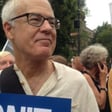
Nobel Laureate Peter Agre: Why Scientists Must succeed Where Politicians Fail
A Nobel laureate on why we should sometimes trust scientists, and not politicians, to fix the future
Peter Agre won the Nobel Prize for Chemistry in 2003, but he’s not interested in playing God. Or even know-it-all. “When Nobel Prize winners start predicting what the stock market would do, or who’s going to win the World Series, they may be beyond their specialty,” he says. Yet in his new book, Can Scientists Succeed Where Politicians Fail?, Agre claims that scientists have succeeded in defusing international crises where politicians have failed. He uses the 2015 Iran nuclear accord as an example, arguing that it only happened because two MIT-trained physicists spoke the same scientific language and brought presents for each other’s grandchildren. Then Trump canceled it. Now, with RFK Jr. running American health policy and the CDC “decimated,” he fears for catastrophe. Peter Agre may not quite be God. But he’s about as close as we will get in our polarized and paranoid world.
* Science diplomacy works when politicians deadlock. The 2015 Iran nuclear accord succeeded because two MIT-trained physicists—Ernest Moniz and Ali Akbar Salehi—could speak the same technical language and find common ground where politicians like John Kerry and Javad Zarif had reached a standstill. They started by bringing presents for each other’s grandchildren.
* Trump’s cancellation of the Iran deal exemplifies political failure. After scientists brokered a successful nuclear agreement involving the P5+1 nations, Trump withdrew from it, believing the deal wasn’t “tough enough.” The result: “we’re back to round zero,” undermining years of scientific diplomacy.
* The bipartisan consensus on science has collapsed. During the Sputnik era, Republicans and Democrats united to fund NASA and transform American science education. Today, that unity is gone—COVID politicized science, Fauci became a lightning rod, and the traditional respect for scientific expertise has eroded across the political spectrum.
* RFK Jr.’s health policies reflect “a lack of fundamental understanding.” Agre warns that Kennedy’s anti-vaccine stance and the decimation of the CDC under his leadership are “dangerous” and “counterintuitive.” Measles, virtually absent from the Western Hemisphere, is now returning without leadership response. Catastrophe, Agre suggests, is not a question of if but when.
* Scientists must inform policy without becoming know-it-alls. Agre argues that scientists shouldn’t make all decisions but must make information accessible to those in power. The challenge: maintaining credibility and trust in an era when Americans are increasingly skeptical of expertise, and when standing up for science risks becoming unavoidably political.
Keen On America is a reader-supported publication. To receive new posts and support my work, consider becoming a free or paid subscriber.
This is a public episode. If you'd like to discuss this with other subscribers or get access to bonus episodes, visit keenon.substack.com/subscribe


















